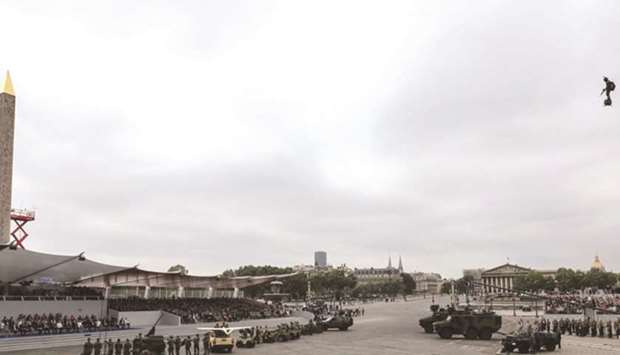French President Emmanuel Macron showcased European military co-operation yesterday in a Bastille Day parade but the aftermath of the glittering event was tarnished by violent clashes between police and protesters.
Key EU leaders, including German Chancellor Angela Merkel and Dutch Prime Minister Mark Rutte, joined Macron in Paris to watch the annual parade that included representatives of nine other European armies in a show of unity.
However, the celebrations of France’s national day were followed by clashes that erupted between protesters and police that recalled violence seen at the peak of the “yellow vest” protest movement earlier this year.
Police fired teargas to clear protesters from the Champs-Elysees, as spectators who had witnessed the parade and startled foreign tourists took cover.
Protesters tore down security barriers, set fire to rubbish bins and portable toilets, and chanted anti-government slogans like “Macron resign!”
The Paris police said in a statement that calm returned to the avenue following the police intervention, with a total of 175 people detained during the day.
Interior Minister Christophe Castaner criticised the protesters, telling journalists: “Those who wanted to prevent this parade should be a little bit ashamed.”
The earlier parade itself had gone without a hitch.
Some 4,300 members of the armed forces marched down the avenue’s famed cobblestones in a tradition that dates back to just after World War I.
However, standing in an open-top command car alongside France’s chief of staff General Francois Lecointre, Macron was met with some jeers and whistles from supporters of the “yellow vest” movement.
Three prominent members of the movement, Jerome Rodrigues, Maxime Nicolle and Eric Drouet, were detained for several hours but later released, sources told AFP.
A futuristic highlight of the parade came when French inventor and entrepreneur Franky Zapata showed off his futuristic flyboard, soaring above the Champs-Elysees and the assembled leaders.
“The army is transforming: it is modernising for our soldiers, our sovereignty and our independence,” Macron told France 2 television in brief remarks.
Closer European defence co-operation has been one of Macron’s key foreign policy aims and the president shows no sign of wavering despite growing political turbulence in Germany and Britain’s looming exit from the European Union.
At the 2017 parade, Macron’s guest of honour was the newly-inaugurated President Donald Trump as the young French leader sought to form a bond with his US counterpart.
But since then ties between Trump and Macron have soured over the US pullouts from the Paris climate accord and the Iran nuclear deal, as well as France’s new law for a tax on digital giants, most of them US companies.
“President Trump has been an excellent ambassador for a Europe of defence,” Armed Forces Minister Florence Parly told the Parisien newspaper yesterday, pointing to “questions, even thinly-veiled threats he made towards Europe or on the durability of American commitment”.
Macron, who pushed the idea of the European Intervention Initiative (EI2) to undertake missions outside of existing structures like the North Atlantic Treaty Organisation (Nato), insisted on the importance of European defence co-operation.
“Never, since the end of World War II has Europe been so important,” Macron, who after coming to power in 2017 controversially dispensed with the president’s traditional July 14 television interview, said in a written statement.
Merkel told reporters after the event that the parade was a “great gesture for a European defence policy” and Germany was “honoured” to have taken part.
In Germany, attention was focused on the chancellor, who recently suffered three episodes of shaking in less than a month while standing at public events.
But she stood for the opening and closing renditions of the French national anthem and for salutes from more than 50 parading units, without any repeat of the problem.
European Commission President Jean-Claude Juncker and Nato Secretary-General Jens Stoltenberg were also guests of honour.
In a sign of France’s ambition to be a leading modern military power under Macron, the president announced on Saturday the creation of a national space force command that will eventually be part of the air force.
Among the foreign airpower taking part in flybys were two British Chinook helicopters, a symbol of British-French defence co-operation even as Brexit looms.
Britain has deployed three of the aircraft and 100 personnel for France’s operation in the African Sahel region.
Meanwhile, police were braced for potential further trouble on the Champs-Elysees later in the day as Algeria face Nigeria in the semi-final of the Africa Cup of Nations football.
Violence and looting blamed on some Algerian fans on the avenue had followed Algeria’s previous match on Thursday, a victory against Ivory Coast.

Zapata chief executive Franky Zapata flies a jet-powered hoverboard, or ‘Flyboard’, prior to the Bastille Day military parade.
